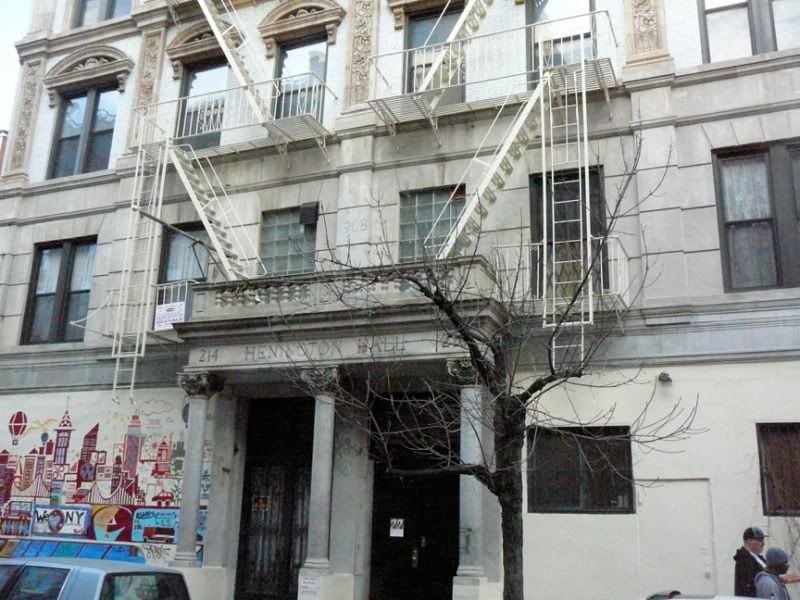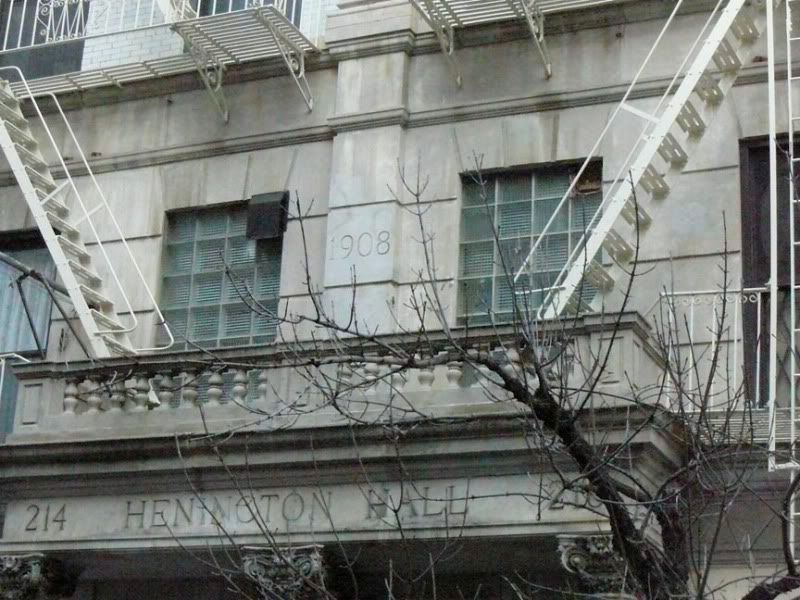

When I googled Henington Hall I discovered a great site called papa's diary
Took half day off for "Yizkor"
for my beloved father (olam haba)
Evening at Country mens
synagogue at Henington Hall
for the "Hakufos"
Enjoyed in the midst of
old country men and
school friends.
1 - Hennington Hall, located at 214 Second Street near Avenue B, was a meeting space often used for political gatherings and speeches. I think the "Country men's synagogue" Papa refers to in this entry means Congregation Sniatyner Agudath Achim, which was made up of landsmen (the Yiddish term for people from the same place that literally translates as "country men") from Papa's home town of Sniatyn. I think this congregation normally met at a multi-use facility called Broadway Manor at 209 East Broadway, but I wouldn't be surprised if they moved around a bit. In any event, Papa has never bothered to specify the congregation's location before, so I assume he deliberately mentions Hennington Hall because it wasn't their usual spot.
About Papa's Diary
My grandfather, Harry Scheurman, kept a diary in 1924 when he was twenty-nine years old. He had been in America for 11 years, but much of his family still lived in the central European, Jewish ghetto of his youth. He was a garment worker, union activist and Zionist fundraiser. He was also unmarried and terribly lonely.
I've always found his diary to be fascinating reading, and I've always wanted to share it with people who might find it interesting. So, each day in 2007 (*2008 update below) I'll transcribe and post each day's corresponding entry, and I'll also annotate with contextual details about his life, historical details about the social, political and cultural subjects in circulation that year, and whatever thoughts and feelings his words bring to mind.
An excerpt from an article about Papa's Diary from the nytimes
1924, Through an Ancestor’s Eyes,
by Les Stone
“My father went to bid me farewell on my long journey to America,” the son later wrote. “The train is waiting, a long embrace, a kiss, tears streaming down from his eyes. Did he have a premonition that we would see each other no more? The train is moving out slowly, and by the light of the moon I could see through the window in the distance my father, weeping and wiping his tears.”
That passage comes from Harry Scheurman’s diary, a slim volume in which he wrote nearly every day of 1924, when he was a single 29-year-old garment worker and ardent Zionist living in a Lower East Side tenement. Since last January, in an extraordinary act of meta-journaling, Mr. Scheurman’s grandson, a 40-year-old Web production executive named Matt Unger, has begun transcribing, posting and annotating a page of the diary each day at a blog he has created, called Papa’s Diary Project.
The diary is an intimate record of Mr. Scheurman’s romantic and emotional life, shadowed by deep homesickness. Mr. Scheurman contrasts the “mechanical” Purim celebrations of New York with those of Sniatyn, and chronicles countless nights at home alone with his radio. On May 12, he learns of his father’s death in Sniatyn, an event that leaves him heartbroken.
But the journal also provides a rich glimpse of the minutiae of a New York life in the 1920s. Mr. Scheurman writes of visiting the “2nd Avenue Baths,” of riding the subway from Brooklyn to the Bronx in the middle of the night with “a pretty girl who is unusually gifted with knowledge,” of dickering with a crooked English-school instructor on behalf of his brother-in-law. On New Year’s Eve, he visits “an East Side joint where Prohibition drinks were freely served.”


























No comments:
Post a Comment